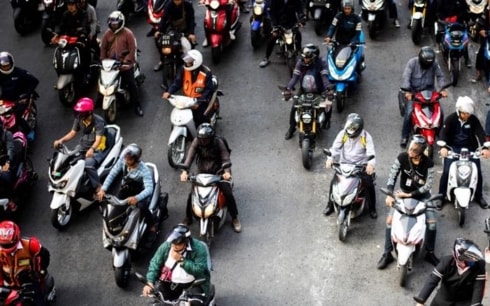Thailand ranks number 1 in Southeast Asia in the number of deaths due to road accidents.
Thailand is famous for its beauty but has a terrible rate of fatal road traffic accidents, ranking first in Southeast Asia.
Driving in Thailand can be a hair-raising experience. During the “7 Dangerous Days” of the New Year, drivers here take their fate into their own hands.
Thai officials said the first festival of the year in the country witnessed bad things such as an increase in traffic collisions, deaths and injuries, when many Thais visited friends or family, hometowns.
|
| Motorcyclists in Thailand. Photo: Getty. |
The causes of road accidents in Thailand are many: drunk driving, bribery of police, and generally poor enforcement of traffic laws. Efforts to curb these causes have so far been ineffective.
Most of the victims were motorcyclists.
According to Thailand's Department of Disaster Prevention and Mitigation, from December 27, 2018 to January 2, 2019, a total of 463 people died in 3,791 traffic accidents, slightly more than the figure from the previous year.
The World Health Organization (WHO) estimates that 22,941 people die each year in road traffic accidents in Thailand, making Thai roads the deadliest in Southeast Asia in terms of traffic.
The total of 22,941 deaths a year represents 62 deaths per day, just slightly lower than the average of 66 deaths per day during the New Year.
The vast majority of those deaths (73%) were of motorcyclists. The number of motorbikes in Thailand has exploded over the past few decades – they are the most common form of transport for most households in the Southeast Asian country.
Legal issues
One of the biggest obstacles to road safety in Thailand is poor enforcement of the law. The Ministry of Interior’s Road Safety Unit said that the majority of deaths during the New Year (41.5%) were due to drunk driving, and 28% were due to speeding.
Chiang Mai province in northern Thailand is a traffic safety hotspot. During the recent New Year holiday, it had the second highest number of accidents in Thailand.
In recent years, the number of traffic police checkpoints in the provincial capital Chiang Mai has increased and signs have been added requiring motorcyclists to wear helmets.
But in many areas of Chiang Mai, it seems that traffic police checkpoints are more about... collecting money than ensuring road safety. It is not uncommon to see drivers in Chiang Mai being stopped by police for not having a helmet or a license, only to jump back on their bikes and drive away a moment later after paying the “fine.”
Nikorn Jumnong, former deputy transport minister of Thailand and chairman of the People's Safety Foundation, told CNN that if we want to improve road safety, we must stop this type of corruption.
“This is one of our big problems and it’s a two-way street,” Mr Nikorn said. “Corrupt law enforcement officers exploit loopholes in the law, and road users don’t follow the law either.”
Of course, those numbers are an improvement from a decade ago. But the WHO estimates that if everyone on a motorbike wore a helmet, up to 40% of deaths could be prevented.
Besides the problem of not wearing helmets and seat belts, other problems such as drunk driving, speeding and lack of control over children are also very serious.
Nikorn assessed: “We need to change the DNA of this country and our instinct in law enforcement. Law enforcement education plays a key role. We have too many laws and I think those laws are good and rich, but there is still the story of enforcement.”
Thailand has made some progress. Its road death rate has dropped from 36.2 per 100,000 people in 2015 to 32.7 per 100,000 people in the latest WHO report.
Looking Globally
Thailand is not the only country struggling with road safety. The risk of dying from a road accident in poor countries is three times higher than in rich ones.
According to Vietnamese media, 111 people died in 147 accidents in just 4 days from December 29, 2018 to January 1, 2019.
Globally, the Pulitzer Center calls road crashes an “epidemic” and the ninth leading cause of death for people of all ages, ahead of HIV/AIDS and tuberculosis. According to figures released by the WHO, 1.35 million people died on the roads globally in 2016.
Michael R Bloomberg, WHO Global Ambassador for Injuries and Noncommunicable Diseases, said in a statement: “Road safety is not getting the attention it deserves and this is one of the great opportunities we have to save lives around the world.”
“We know what interventions work,” Bloomberg continued. “Strong policies and effective enforcement, smart road design, and public awareness campaigns have the potential to save millions of lives in the coming decades.”









